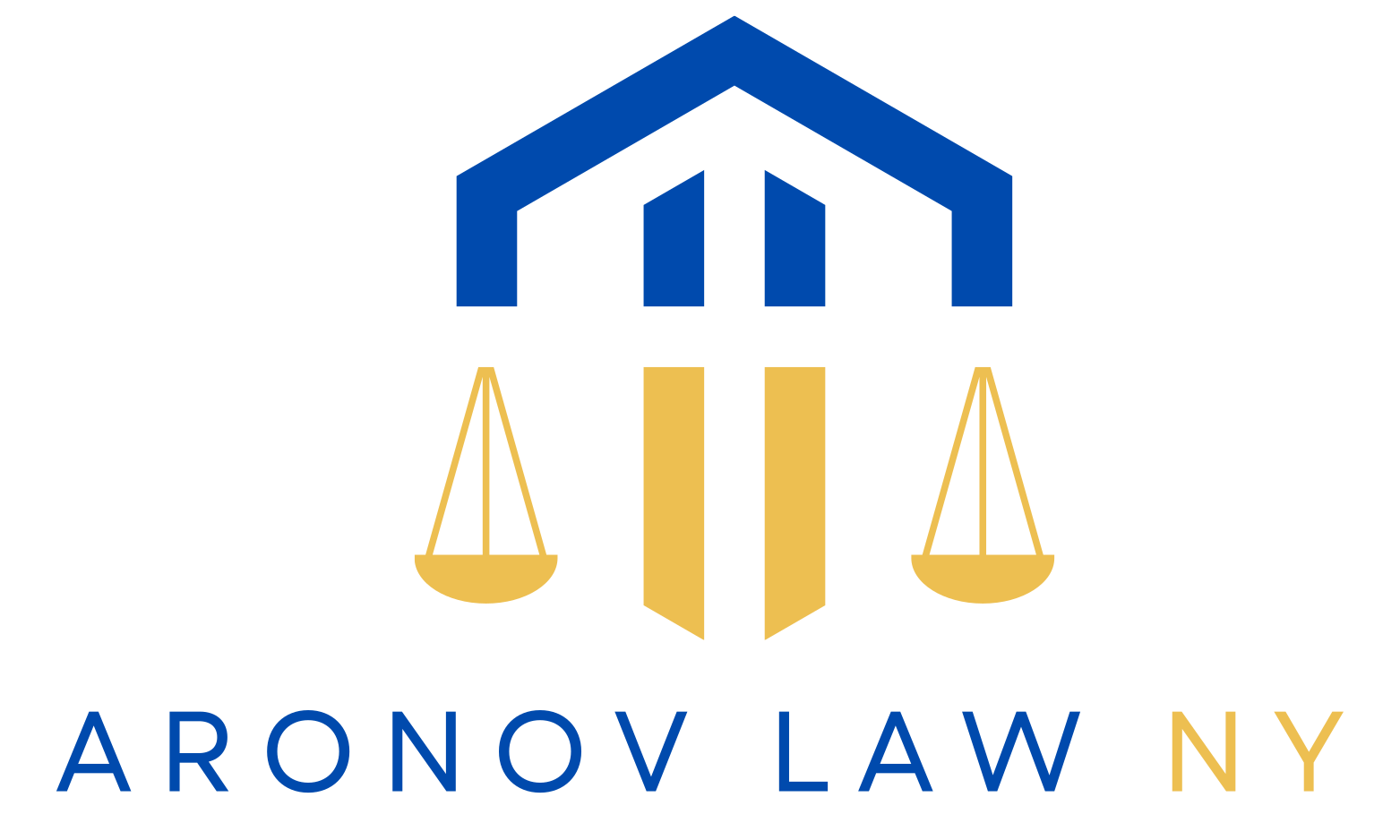Divorce Lawyer Queens, NY - 5 NYC Offices
88-02 136th Street, Jamaica, NY 11418
15 W 47th St #1500, New York, NY 10001
Aronov Law NY: Highly Experienced Divorce Attorneys With The Highest Ratings On FindLaw, Avvo, SuperLawyers Google & All The Top Legal Forums. We make it personal.
Handling divorce is never easy. Whether your marriage came to a peaceful conclusion or the separation is fraught with conflicts, the process can feel overwhelming. At Aronov Law, we understand the emotional, legal, and financial struggles tied to divorce. Our team of dedicated divorce attorneys can support you through the process with compassionate, professional guidance.
Serving all boroughs of New York City—including Queens, Brooklyn, Manhattan, Staten Island, and the Bronx—we have offices conveniently located near landmarks like Flushing Meadows-Corona Park, Prospect Park, Times Square, and Staten Island Greenbelt. Our goal is to make it easy for you to meet with a trusted New York divorce attorney that can walk you through every single legal nuance in the field of matrimonial law that is applicable to your case. Our main corporate offices are located in Forest Hills & Jamaica and Midtown Manhattan but we also have several other offices in the Five Boroughs. Please call us now to schedule at the place and time that will be most convenient for you.
If you’re ready to move forward with compassionate and skilled legal support, contact Aronov Law today for a free consultation.
Matrimonial Consultation In Queens, NY or 5 Other NYC Offices
-
- Why Choose Aronov Law for Your New York City Divorce Case
- Understanding NYC Divorce Laws
- What Are the 7 Legal Grounds for Fault-Based Divorce in NYC
- How the Divorce Process Works in New York
- Property Rights During a Divorce
- New York City Divorce FAQs
- Contact a Trusted New York City Divorce Lawyer at Aronov Law
Why Choose Aronov Law As Your Divorce Attorney
Divorce has a way of amplifying life’s challenges. That’s where Aronov Law steps in—not only to provide legal advice, but also to support and advocate for your best interests. Here’s why clients across the Big Apple choose our divorce attorneys to represent them during one of the most difficult chapters of their lives.
Personalized Guidance
Every marriage is unique, and so is every divorce. Whether you’re dividing assets, deciding on child custody, or working through spousal support terms, Aronov Law builds a legal strategy around your specific needs. We take the time to listen, understand, and craft a plan that prioritizes your future.
Award-Winning Attorneys
Aronov Law proudly holds some of the highest ratings across Avvo, FindLaw, Super Lawyers, and Google. These accolades reflect our success in securing favorable outcomes for our clients and the dedication our attorneys bring to every case.
Experience
Navigating NYC divorce laws can feel daunting, but with Aronov Law, you have attorneys who understand the complexities of New York family law. With offices in all five boroughs, we’re not just your legal team—we’re your neighbors.
Stress-Free Legal Support
Divorce often stirs emotional confrontations and stress. We work to ease this burden, ensuring that you can focus on what matters most—your well-being and future. From filing paperwork to negotiating agreements, our attorneys manage the legal legwork while advocating on your behalf.
Understanding Queens Divorce Laws
Each divorce is different, and understanding the types of divorce available in New York can help you make informed decisions. Below, we break down the five main categories.
Uncontested Divorce
An uncontested divorce occurs when spouses agree on all aspects of the divorce, including property division, child custody, and alimony. This type of divorce is typically the fastest and most affordable since it avoids lengthy court proceedings.
However, even if you and your spouse are on the same page about the terms of your divorce, it’s critical to have an experienced attorney review your agreements. Aronov Law ensures that everything is legally sound and advocates for your best interests, helping you avoid potential complications down the road.
Contested Divorce
If you and your spouse cannot agree on key aspects of your divorce, it becomes a contested case. These disputes may arise over finances, child custody, or property division and often require mediation, court hearings, or both to resolve.
While contested divorces can take longer to finalize, our lawyers can guide you through the process. We are skilled negotiators and fierce advocates in court, ensuring your voice is heard and your rights are protected.
No-Fault Divorce
New York recognizes no-fault divorce, where neither party is blamed for the marriage breakdown. A no-fault divorce requires one spouse to state that the marriage has been irretrievably broken for at least six months.
No-fault divorce applies to both uncontested and contested cases and is the most commonly pursued type of divorce in New York.
Fault-Based Divorce
Fault-based divorces are based on one party’s wrongdoing—such as adultery, abandonment, or cruelty. While this option is less common, it may be pursued in cases where proving fault could impact alimony or child custody decisions.
Aronov Law can help you weigh whether a fault-based divorce is the right choice in your situation and ensure you have the evidence required to proceed.
Summary Divorce
Summary divorces are designed for couples who meet specific criteria, such as being married for under 10 years, having no children, and holding minimal property or debt. These cases are streamlined and can often be resolved quickly with the help of an experienced attorney.
What Are the 7 Legal Grounds for Fault-Based Divorce in NYC
While many couples in New York choose no-fault divorce, there are situations where a fault-based divorce may be appropriate. Below are the legally recognized grounds for fault-based divorce in New York City.
- Adultery: If one spouse engages in a sexual relationship outside of the marriage, this can serve as grounds for an adultery-based divorce. Evidence such as photographs, text messages, or witness testimony may be required to prove infidelity.
- Cruel and Inhuman Treatment: When one spouse creates a living environment that is unsafe or intolerable through emotional or physical abuse, the affected party can pursue divorce on the grounds of cruelty.
- Abandonment: If one spouse deserts the other for a year or longer, this constitutes abandonment. It may also include emotional abandonment or the refusal to engage in intimacy.
- Imprisonment: A fault divorce may be pursued if your spouse is sentenced for three or more years during your marriage.
- Living Apart by Agreement: This applies when a couple has lived separately for at least a year under the terms of a written separation agreement.
- Judicial Separation: A divorce can also be based on judicial separation, where the couple obtains a legal separation order from the court and lives separately for one year or more.
- Incurable Insanity: If one spouse is diagnosed with incurable insanity for a period of five years or longer, the other spouse may file for divorce under this ground.
Filing for a fault-based divorce can be more complex than a no-fault case. Aronov Law can guide you through the process, compiling the necessary evidence and ensuring your case is presented effectively in court.
How the Divorce Process Works in New York
Divorce in New York begins when one spouse files a divorce petition with the court. This document includes details about the marriage, grounds for divorce, and any requests for property distribution, child custody, or spousal support. The petition is then served to the other spouse, who has a set period to respond and state their position on the terms outlined.
If both parties agree on all terms, the case proceeds as an uncontested divorce, and a judge can finalize it relatively quickly, sometimes within six weeks. However, if disagreements arise, the divorce becomes contested. This may involve mediation sessions, court hearings, or even a trial to resolve disputes over assets, custody, alimony, or other issues.
Once all matters are settled, either by agreement or court ruling, the final judgment of divorce is signed by a judge. This judgment legally ends the marriage and outlines the resolution of all related matters. Given the complexities involved, having an experienced attorney by your side throughout the process can make a significant difference in protecting your interests and lead to a faster resolution.
Property Rights During a Divorce
New York follows the principle of equitable distribution when dividing marital property. This means that assets and debts acquired during the marriage are divided in a manner deemed fair by the court, rather than split equally. Marital property includes shared assets such as income, real estate, retirement accounts, and personal items obtained during the marriage.
The court considers several factors when determining what is equitable, including the length of the marriage, the income and earning potential of each spouse, and contributions one spouse made to the other’s career or education. Contributions as a homemaker or caregiver are also valued as part of this process.
However, personal property—such as items owned before the marriage, inheritances, or gifts kept separate—is not subject to division.
New York City Divorce FAQs
Here are some frequently asked questions about divorces in New York City:
Is New York a 50/50 Divorce State?
No, New York is not a 50/50 divorce state. Instead, it follows the principle of equitable distribution. This means that marital property is divided based on what is fair, not necessarily equal. The court considers factors like each spouse’s financial situation, contributions to the marriage, and future needs to determine an equitable distribution.
How Long Will My Divorce Take?
The length of your divorce depends on whether it’s contested or uncontested. An uncontested divorce, where both parties agree on all terms, can take as little as six weeks to finalize. However, a contested divorce with disputes over property, custody, or other issues may take several months or even years to resolve. An experienced attorney can help expedite the process by handling paperwork, negotiations, and court appearances.
Do I Need a Lawyer for an Uncontested Divorce?
While an uncontested divorce is simpler than a contested one, it’s still wise to have a lawyer. An attorney can review your agreement to ensure your rights are protected, and the terms are legally enforceable. This can help prevent future disputes or complications.
Who Gets The Children In New York State?
Child custody decisions in New York are based on the best interests of the child. The court considers factors such as each parent’s ability to provide a stable home, the child’s relationship with each parent, and both parents’ physical and mental health. Joint custody is common, but the court will prioritize arrangements that benefit the child’s overall well-being.
How Much Does a Divorce Cost?
The cost of a divorce in New York varies depending on whether it’s contested or uncontested. An uncontested divorce is typically less expensive since there are no legal disputes to resolve. However, contested divorces, which involve disagreements over property, custody, or other issues, can be more costly due to the need for mediation or court hearings. At Aronov Law, we provide clear, upfront pricing and work to help you reach a resolution in the most cost-effective way possible.
Should We Get A Mediator?
Divorce mediation is a process where both spouses work with a neutral third party to resolve disputes outside of court. It can be a quicker, less stressful, and more affordable way to settle issues like property division and child custody. While mediators do not offer legal advice, Aronov Law can support you during and after mediation to ensure your interests are protected and the final agreement is legally sound.
Am I Entitled to Spousal Support?
Spousal support, or alimony, is determined based on factors like the length of the marriage, each spouse’s income, and their future earning potential. Courts also consider contributions to the household, such as one spouse supporting the other’s career or staying home to care for children. Your lawyer will assess your situation and advocate for a fair arrangement, whether you’re seeking alimony or challenging an unfair request.
Conclusion
No matter the circumstances of your divorce, Aronov Law can provide skilled legal representation and compassionate support. Our experienced attorneys understand the challenges you’re facing and are committed to achieving the best possible outcome for you and your family.
With offices throughout New York City, we’re conveniently located to serve clients in Queens, Brooklyn, Manhattan, Staten Island, and the Bronx. When you work with Aronov Law, you can trust that your case is in capable hands.
The first step in moving forward is reaching out. Contact Divorce Lawyer Queens Aronov Law NY P.C. today at 718-206-2050 or through our adjacent online form to schedule your free and confidential consultation with our trustworthy NYC divorce attorney.
Our Office Locations:
Corporate Office:
88-02 136th Street,
Queens, NY 11418
Second Largest Divorce Law Office:
Divorce Lawyer Queens Aronov Law NY P.C.
98-14 Queens Blvd, Queens, NY 11374
Call To Schedule Before Arrival
(718) 206-2050
Midtown Manhattan Main NYC Divorce Branch:
15 W 47th St #1500, New York, NY 10001
Forest Hills, Rego Park, Kew Gardens, Elmhurst & Jamaica, NY Divorce Branches
Our corporate divorce law office is in Queens County, NY and it follows that majority of our law offices are located in this area. Rest assure we have offices all over the city including Manhattan, Brooklyn (Kings County) & Bronx but in Queens we are near you wherever you are in the borough.










